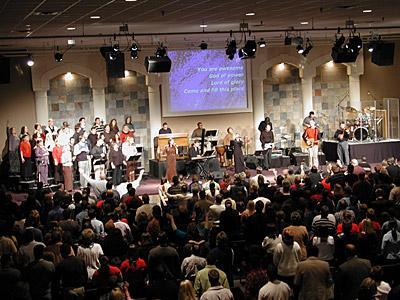Families walk in, the music starts and everyone begins to sing. It’s an ordinary Sunday at an extraordinary church.
President George W. Bush pointed to Healing Place Church in his annual State of the Union address Jan. 28 as one of the nation’s top recovery programs.
“Our nation is blessed with recovery programs that do amazing work,” Bush said in the speech. “One of them is found at the Healing Place Church in Baton Rouge, La. A man in the program said, ‘God does miracles in people’s lives, and you never think it could be you.’ Tonight, let us bring to all Americans who struggle with drug addiction this message of hope: The miracle of recovery is possible, and it could be you.”
The program Bush talked about is called Set Free Indeed. According to Healing Place’s Web site, the ministry believes through prayer, mentoring and a strong one-on-one accountability system, people can find the strength to break any addiction.
Healing Place pastor Wayne Austin said Laura Bush invited Tonja Miles, who runs the church’s recovery program, to Washington, D.C., to hear the speech. But church members never thought President Bush would mention it in the speech.
“It was like on the Thursday we got a call from the White House,” he said. “We were all shocked that he said Healing Place Church.”
Austin called it “a miracle.” And while it’s a humbling experience to be the one church mentioned in Bush’s speech, it also is keeping the church busy.
“Now everywhere you turn, someone’s calling,” he said. “We just want to do everything we can to help those who are hurting.”
Pastor Dino Rizzo founded Healing Place on the principle of helping the hurting, its Web site says, and Austin said the church stresses “manifesting Christ” — putting more importance on acting like Christ than anything else.
Aside from helping people break addictions, the church also has a ministry at LSU called Journey, Austin said.
“I’ve always felt like life is a journey,” said Johnny Green, the Journey pastor. “I want to always feel like I’m going somewhere.”
Green said the group meets in Dodson Auditorium Monday nights at 7:30 p.m. In Journey, Green said the group wanted to do something different, using video and more upbeat music. For example, they are working on a three-part series called “The Bachelor,” which pokes fun at the show and deals with dating issues, he said.
“Even though everybody likes ‘The Bachelor,’ that’s probably not the best way to meet someone,” Green said. “We’re going to use that to talk about God’s plan for relationships.”
Bush’s speech affected the drug recovery program in that they received more phone calls, but Green said he’s not sure how or if it will affect Journey because people may not make the connection between the church and the ministry.
By giving Journey its own name, it gives it an identity within and outside the church, so although it is a part of Healing Place, students don’t feel pressured to go there, Green said.
Tyler Tullos, a business sophomore, said he got involved with Healing Place through a friend, but the low-pressure atmosphere keeps him there.
Tullos said he liked that he didn’t feel as if he had to fit a mold to go to Healing Place. And because it focuses more on helping people than strict rules and traditions like other churches, it attracts young people, he said.
“It’s all about God and Jesus,” he said. “There’s never a time when that is a question.”
Green said he believes Bush’s speech will be positive for Healing Place, because with the notoriety, it will have the opportunity to help more people.
“The main reason you want people to know about you is so when they’re in trouble, they know who to call,” he said.
It also makes church members more aware of their actions, Tullos said.
“Once the president says something like that, it brings attention to our church, and we have to be on our toes,” he said.
To learn more about the church’s beliefs and ministry, visit www.healingplacechurch.org.
Church sees boost in phone calls
February 11, 2003

Church sees boost in phone calls








